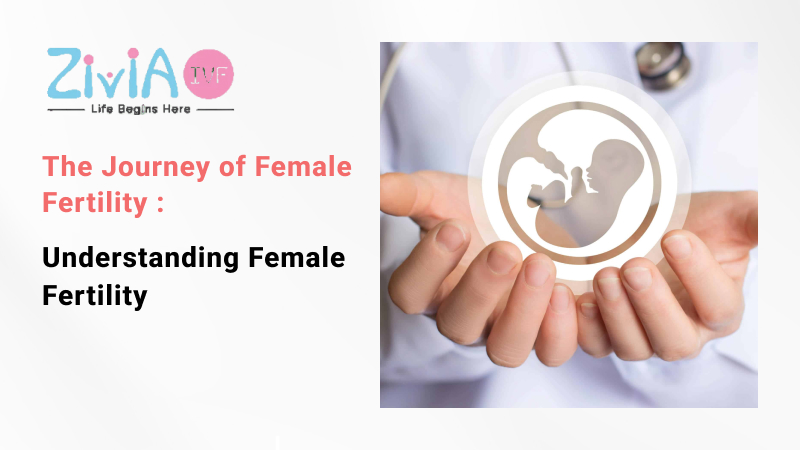
Female fertility is a remarkable and intricate aspect of human life. The ability to conceive and nurture a new life within the womb is a testament to the wonders of the female reproductive system. In this long-form blog, we will delve into the various aspects of female fertility, including the menstrual cycle, factors affecting fertility, optimizing reproductive health, and available fertility treatments. By understanding and nurturing female fertility, women can empower themselves to make informed decisions about their reproductive journey.
Also Read: Secondary Infertility – What do you need to know about it?
What Is The Menstrual Cycle?
The menstrual cycle, which typically lasts about 28 days, is the foundation of female fertility. It involves a complex interplay of hormones and physiological changes within the body. The cycle can be divided into different phases: menstruation, the follicular phase, ovulation, and the luteal phase.
During menstruation, the shedding of the uterine lining occurs, marking the beginning of a new cycle. The follicular phase follows, characterized by the maturation of an egg within the ovary. Ovulation, the release of a mature egg from the ovary, occurs midway through the cycle. The luteal phase then ensues, during which the uterus prepares for potential implantation of a fertilized egg.
What Are The Factors Affecting Female Fertility?
Numerous factors can impact a woman’s fertility. Some of the key considerations include:
- Age: Female fertility peaks in the late teens and early twenties, gradually declining thereafter. As women age, the quality and quantity of eggs diminish, leading to reduced fertility and an increased risk of chromosomal abnormalities.
- Lifestyle Factors: Certain lifestyle choices can influence fertility. Factors such as smoking, excessive alcohol consumption, drug use, poor nutrition, obesity, and stress can all negatively impact reproductive health. It is important to prioritize a healthy lifestyle to optimize fertility.
- Reproductive Disorders: Conditions such as polycystic ovary syndrome (PCOS), endometriosis, and uterine abnormalities can affect fertility. Seeking medical evaluation and treatment for these conditions is essential for women struggling to conceive.
- Sexual Health: Maintaining good sexual health is crucial for fertility. Sexually transmitted infections (STIs) can cause pelvic inflammatory disease (PID), leading to fallopian tube damage and infertility. Regular check-ups and practicing safe sex are vital for reproductive well-being.
How To Optimize Female Fertility?
Fortunately, there are several ways to optimize female fertility and improve the chances of conception:
- Healthy Lifestyle: Adopting a well-balanced diet, engaging in regular physical activity, managing stress, and avoiding harmful substances can all contribute to better reproductive health.
- Tracking Ovulation: Understanding the timing of ovulation can be helpful when trying to conceive. Charting basal body temperature, monitoring cervical mucus changes, and using ovulation predictor kits can assist in identifying the most fertile window.
- Preconception Care: Prior to attempting conception, it is advisable to visit a fertility specialist for preconception care. This includes reviewing medical history, optimizing health, and addressing any underlying conditions that may affect fertility.
- Fertility Awareness Methods: Learning about fertility awareness methods, such as the sympto-thermal method or the Creighton Model, can empower women to understand their cycles and identify potential issues.
What Are The Options In Fertility Treatments?
In cases where natural conception is challenging, various fertility treatments can help fulfill the dream of parenthood:
- Ovulation Induction: Medications, such as clomiphene citrate or letrozole, can stimulate ovulation and enhance fertility in women with irregular cycles or anovulation.
- Intrauterine Insemination (IUI): IUI involves the placement of prepared sperm directly into the uterus, increasing the chances of fertilization. This procedure is often recommended for couples with unexplained infertility, mild male factor infertility, or cervical issues.
- In Vitro Fertilization (IVF): IVF is a widely known and highly effective fertility treatment. It involves the retrieval of eggs from the ovaries, fertilization with sperm in a laboratory setting, and the transfer of resulting embryos into the uterus. IVF is suitable for various fertility challenges, including tubal blockage, severe male factor infertility, advanced maternal age, and unexplained infertility.
- Donor Egg or Sperm: For individuals or couples facing significant fertility challenges, using donated eggs or sperm can provide an alternative pathway to parenthood. This option allows individuals with diminished ovarian reserve or severe male infertility to have a genetic connection to their child.
- Assisted Reproductive Technologies (ART): ART encompasses advanced procedures that can assist with specific fertility challenges. These include intracytoplasmic sperm injection (ICSI), where a single sperm is injected directly into an egg, and preimplantation genetic testing (PGT), which screens embryos for chromosomal abnormalities before transfer.
Conclusion
Female fertility is a profound and complex aspect of human life. Understanding the menstrual cycle, identifying factors affecting fertility, and optimizing reproductive health are essential steps for those seeking to conceive.
With advancements in fertility treatments, individuals and couples facing challenges can explore various options to fulfill their desire to become parents. Throughout this journey, emotional support and self-care are paramount to maintain overall well-being. By empowering ourselves with knowledge and seeking appropriate guidance, we can navigate the intricacies of female fertility with hope and resilience.
